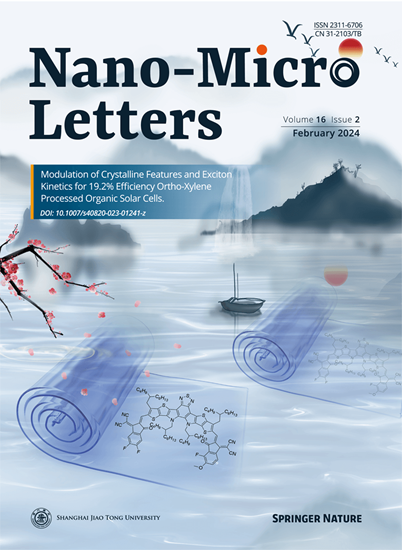Light-Activated Virtual Sensor Array with Machine Learning for Non-Invasive Diagnosis of Coronary Heart Disease
IF 26.6
1区 材料科学
Q1 Engineering
引用次数: 0
Abstract
Highlights
-
Photoresponsive black phosphorus (BP)/Ti3C2Tx composites were synthesized by a self-assembly strategy.
-
Enhanced gas sensitive property was achieved by visible light modulation.
-
Light activated virtual sensor array was fabricated based on BP/Ti3C2Tx composite.
-
Diagnosis of coronary heart disease was achieved with the help of machine learning.

利用机器学习的光激活虚拟传感器阵列用于冠心病的非侵入性诊断。
早期无创诊断冠心病(CHD)至关重要。然而,通过检测呼气来实现冠心病的准确诊断具有挑战性。在这项工作中,利用自组装策略配制了具有高气体灵敏度和光响应性的黑磷(BP)与二维碳化物和氮化物(MXene)的异质结构复合物。在光调节下制备了基于 BP/Ti3C2Tx 的光激活虚拟传感器阵列(LAVSA),并将其进一步组装成即时气体传感平台(IGSP)。此外,还引入了机器学习(ML)算法,帮助 IGSP 检测和识别呼气样本信号,以诊断心脏病。由于 BP 和 Ti3C2Tx 以及光激发的协同作用,合成的异质结构复合物比原始 Ti3C2Tx 表现出更高的性能,响应值比原始 Ti3C2Tx 高 26%。此外,在模式识别算法的帮助下,LAVSA 成功地检测和识别了 15 种气味分子,分别与醇、酮、醛、酯和酸有关。同时,在 ML 的帮助下,IGSP 对 45 名健康人和心脏病患者志愿者呼气气味的检测准确率达到了 69.2%。总之,我们设计并制造出了一种即时、低成本、准确的原型,用于无创诊断心脏病,为诊断其他疾病和其他更复杂的应用场景提供了通用解决方案。
本文章由计算机程序翻译,如有差异,请以英文原文为准。
求助全文
约1分钟内获得全文
求助全文
来源期刊

Nano-Micro Letters
NANOSCIENCE & NANOTECHNOLOGY-MATERIALS SCIENCE, MULTIDISCIPLINARY
CiteScore
32.60
自引率
4.90%
发文量
981
审稿时长
1.1 months
期刊介绍:
Nano-Micro Letters is a peer-reviewed, international, interdisciplinary, and open-access journal published under the SpringerOpen brand.
Nano-Micro Letters focuses on the science, experiments, engineering, technologies, and applications of nano- or microscale structures and systems in various fields such as physics, chemistry, biology, material science, and pharmacy.It also explores the expanding interfaces between these fields.
Nano-Micro Letters particularly emphasizes the bottom-up approach in the length scale from nano to micro. This approach is crucial for achieving industrial applications in nanotechnology, as it involves the assembly, modification, and control of nanostructures on a microscale.
文献相关原料
公司名称
产品信息
阿拉丁
N, N-dimethylformamide (DMF)
 求助内容:
求助内容: 应助结果提醒方式:
应助结果提醒方式:


